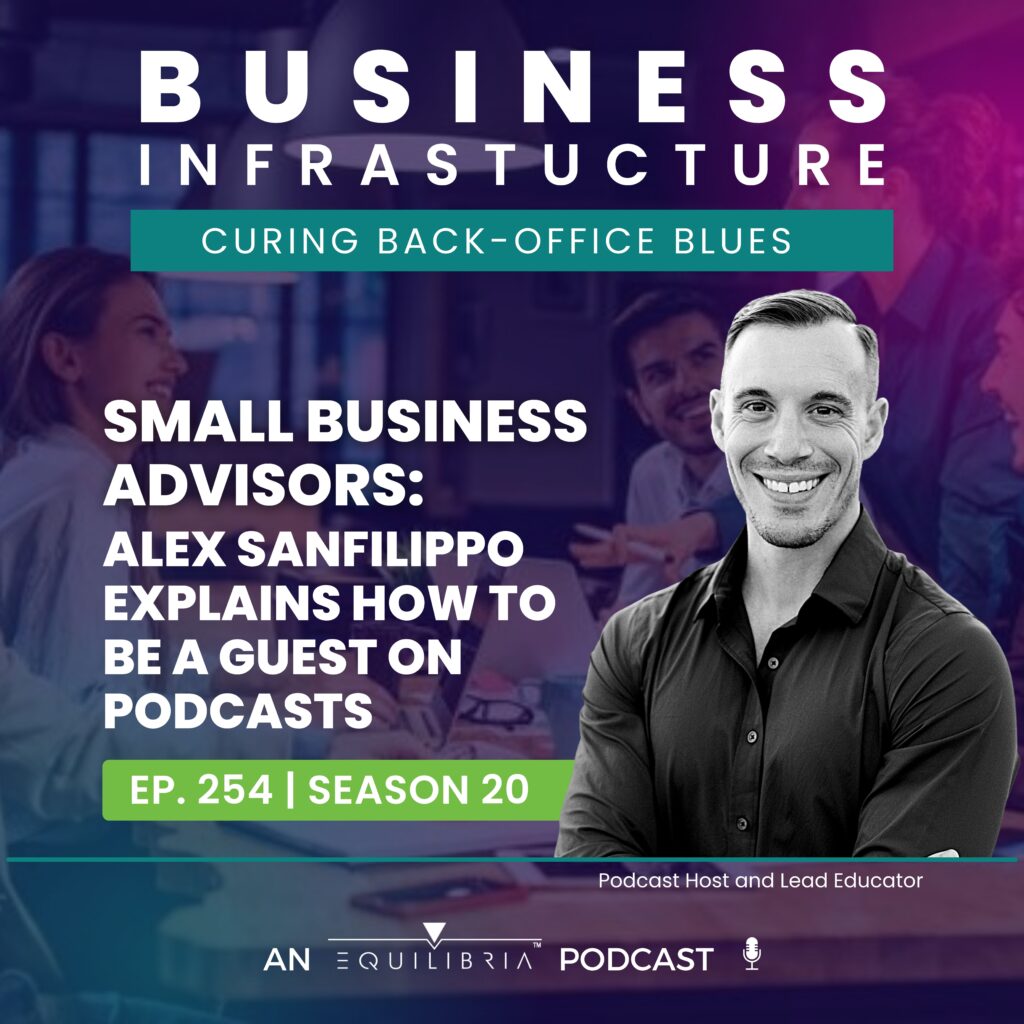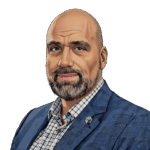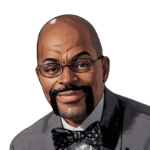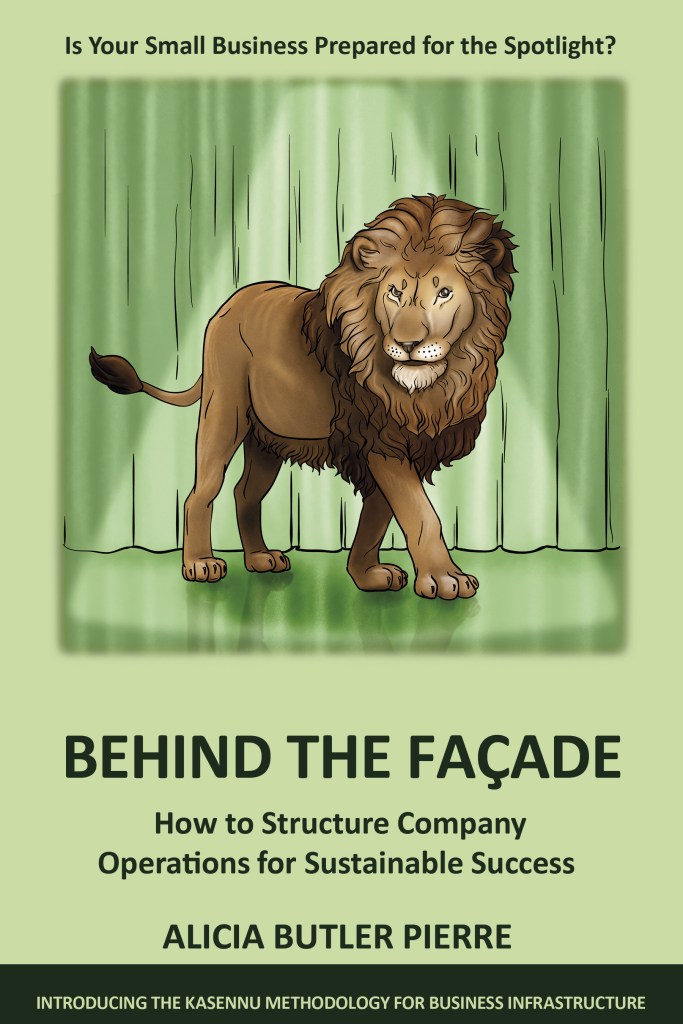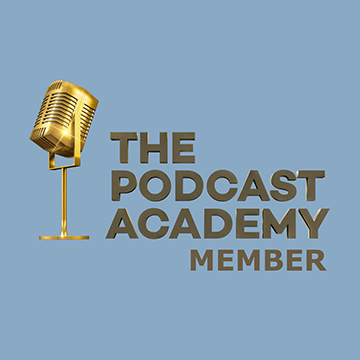Transcript
This episode is underwritten by Equilibria, Inc. the company behind this podcast where we design scale-ready business infrastructure for fast-growing small businesses.

Ecclesiastes 9:11 states that “The race is not given to the swift nor the strong but unto them that endure to the end.” Similarly, business success is not necessarily given to the smartest person in the room, but to the one who is the most visible. Being visible and breaking through the noise is no small feat. After all, closed mouths don’t get fed. Think about that.
We’re officially through the halfway point of Season 20 of the Business Infrastructure podcast – the show where we share operational tips, strategies, and tactics to help you cure any back-office blues you might be experiencing. I’m Alicia Butler Pierre and this season features 12 small business advisors, each with a unique skillset they’ll share with you.
Today’s advisor is a prolific podcaster, serial entrepreneur, and strong advocate for becoming a guest on podcasts as a way to increase your visibility. Now, why does that matter? Because podcasts provide a medium that enables you to put a name and a voice to your brand.
This is Episode 254 – Alex Sanfilippo Explains How to Be a Guest on Podcasts.
Hey, my name is Alex Sanfilippo. I am here in sunny Jacksonville, Florida, and I run a company called PodPros. I’m the CEO and the founder of it, and basically, it is a hundred percent podcasting. We create software solutions specifically for podcast hosts and guests so they can get their messages heard and elevated through the world of podcasting.

Out the gate, you can probably tell that Alex is full of energy – and it’s not an act. He’s an incredibly friendly and gracious person whom I had the pleasure of meeting during a recent Podcast Movement Evolutions conference in Las Vegas. There we were waiting for a train to arrive – me, Alex, his wife, Alecia, our mutual friend Christina Barsi, and some other folks in the podcasting industry. It was the last night of the conference. We were all tired but decided since we were all still there that we might as well hang out together. One of the first things Alex and I discovered is that we’re both equally passionate about processes and procedures. And that got us to talking about entrepreneurship, which is where this journey with Alex begins – his first business venture.
If you can call it a venture. So, most of the kids in the neighborhood were selling lemonade. And I was like, I’m going to do that. And, started to, and I was like, well you don’t make any money doing this. There’s no profit margin. Mom and dad, yes, they paid for the stuff, but you don’t make that money back. And so, in my mind, I’m like, I’m just not going to do any of this stuff. Forget it. But then one day we grew up across the street from a golf course, and all the parents of the kids’ neighborhoods said, “Don’t play in the golf course.” And obviously, that means we’re all running over the golf course as soon as we can. So, we were on the golf course and there was a golf ball. I picked it up and this golfer rides behind a car.

And he goes, “Hey kid, what does that ball say on it?” I was like, “Title is prov one.” And he goes, “I’ll give you $3 for it.” So, I gave him the ball and he gave me $3, and then a light bulb went off. I’m like, “You can make money doing this because there’s more of these in the lakes.” And so, all the kids that were there with me. We’re going to start digging through the lakes, through everything. We’re going to find golf balls. And then we made the decision, we’ll clean ’em up and Saturday morning we’ll sell ’em. And each of us was making hundreds of dollars every Saturday morning, a bunch of 10, 11-year-old little kids, it was really fun.
Fun, but a young Alex also had an epiphany.
But for the first time, I felt like I found something that came very naturally to me. And I say that because I wasn’t really very good at school. And weirdly enough, I wasn’t good at video games either. My brothers were musicians, and I wasn’t, and I wasn’t athletic but I was good at this. I was good at bringing a group together of young kids who don’t like to work and getting them to do
something. And we got the result we were looking for. And I kind of vowed, even at that young age, never let it go. That was my introduction to entrepreneurship. Opened me up to a world that I didn’t know existed.
This was Alex’s first lesson in entrepreneurship, and it didn’t come in the classroom. Find a problem that many people have and offer a solution that they’re willing to pay for. And his passion for entrepreneurship didn’t stop there, it only grew as he became a teenager.
I did a few different side hustles. I discovered eBay. I started flipping things or buying things and I did some stuff in a technology startup in, real estate. So, I was building virtual tours of homes with a team. I had photographers, editors, like that whole nine yards. That was my first real business. I don’t have a whole bunch to share there cause unfortunately when 2008 hit everything I was doing at that point just went by the wayside. And because of that, I actually got into corporate, I decided, you know what? I’m going to find a company to work for. And that was my first job.
From his first business to his first job, Alex went straight out of high school to work at an aerospace company.

When I got started, I was a part-time receiving clerk. Fast forward throughout the years, I ended with my last couple years there being at the C-suite level, working my way up over the years.
It took Alex 15 years to advance from being a clerk to a C-suite executive. And just as things were really starting to get good financially, he left. I was curious, as I’m sure you are – why on Earth would he give up the comforts, perks, and benefits of being at the top of the food chain in corporate to venture into the unknown?
Alicia, I’ve been on a lot of podcasts. No one has ever asked me the question that way. The perks were the things that were the hardest to let go of. I had a good paycheck and salary, don’t get me wrong, I’m like, man, they pay for everything. Like, I don’t even know how to pay my own phone bill! We went from just millions of dollars to, at year 12, becoming a publicly traded multi-billion-dollar company.
But something changed when companies go public. You can’t really be an intraprepreneur anymore. I was now supposed to follow the status quo because we had shareholders, we had boards.
And those shareholders and boards have a much different focus than a scrappy startup. So, Alex left and started doing more of those side hustles just as he did as a teenager. Desperate to find his passion, he tried different things.
And like all good entrepreneurs, Alicia, I had like a ton of failures along the way, right Like a bunch of things that just didn’t work. And finally, I actually realized maybe I’m not good at this entrepreneurship thing. And that’s what brought me to podcasting. I started a podcast to talk to people who had successfully left a nine-to-five job to become a full-time entrepreneur, to ask them
what that transition was like and how they did it.
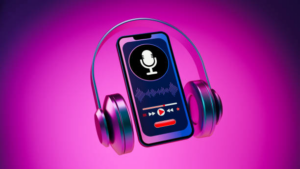
And I was going to bring people with me. It was going to be like a public conversation, right I was learning from myself, but also for, to bring other people along on that journey. And I actually figured it out through learning from these other individuals. And the crazy thing that happened though is I knew I wanted to be an entrepreneur, but I didn’t know what I wanted to do. But when I got into this podcasting thing, I realized almost immediately what I wanted to do was podcasting. And that’s ultimately what led me to make the leap into being a full-time podcaster if you will.
That leap happened in June 2020. At that point, Alex found his passion but needed to monetize it. It was time to apply the lessons he learned from other successful entrepreneurs. In fact, he’s distilled those lessons in a way that’s easy to understand.
Basically, there are four things. One, you find an area of passion and then you get into that community within that passion, right? So you dive into the community. So, for me, I started speaking at podcasting conferences cause I came passionate about being a podcaster. I got into the community and started speaking at the events. The third thing is to find the simplest problem that they’re struggling with. And the final thing is to offer the fastest, simplest solution to that problem.
So those four steps, find the area of passion, get in the community, find the problem, and offer a solution.
And reflecting on those four steps is what led Alex to start PodMatch. It was a solution to make it easy for podcast hosts to find guests to interview on their shows.

They’re all telling me, “Alex, I’m having trouble finding ideal guests for my show.” And I realized that’s the problem.
So, I went to the whiteboards, and I was like, you know what? Dating apps do this really well. People are having trouble finding dates. Pod Match is a software that automatically connects podcast guests and hosts together for interviews. It based is on things you’re interested in and what you can talk about, what they’re looking for. All that works just like a dating app. But instead of connecting for dates, it connects you for podcast interviews.
Alex’s quest to discover problems in the podcasting industry didn’t end there. He then started another company called PodLottery.
We solved the main pain point I could find, but the next thing I saw was that podcast hosts were having trouble getting reviews on their shows. Even though we ask on the show and like, I’ll even tell it now, if you’re listening to this and you’ve not left a review on Alicia’s show, please go do that. That goes such a long way, not just so we can see the number. It actually doesn’t help with ranking at all. Apple has publicly said that, but it helps us know that we’re actually reaching somebody. All this hard work we put in this labor of love is actually worth it. So, pause for a minute, go leave that review and then come back and continue.
Well, you heard him…go leave that review. Please! Pause this recording right now, wherever you’re listening, leave a rating and review, and come right back. Don’t worry, we’ll wait. …. Thank you! And now back to our regularly scheduled program. Alex was describing what PodLottery is.
Anyway, we just saw it being such a problem that we decided to build something so that podcast hosts could leave each other reviews.
Alex also started a company called PodcastSOP to help podcasters with their back-office production processes. Eventually, he rolled up all of these companies into a parent company called PodPros. Coming up after the break, we’ll take a deeper dive into PodMatch. Alex will share exactly how you can use this free service to raise awareness for your business through podcast guesting.
How do you know if your business is growing faster than you can keep up with? If you have trouble keeping up with things like deliveries and projects. Your customers are angry, team turnover is high, and the complaints are piling up. Where can you go for relief? How can you save your business from the chaos of unmanageable, fast growth?
It might be time to build business infrastructure. Business infrastructure is a system for linking the people, processes, tools, and technologies that act as the heartbeat of your back-office operations. It gives your fast-growing small business a stable foundation to not only continue growing but to scale in a profitable, sustainable, and repeatable way.
That’s why if you want a business that can consistently operate without your daily presence, then the Smooth Operator course is for you. It’s an online introductory course on business infrastructure that can provide you with proven tools, tactics, and techniques to calm the chaos and restore order. Go to SmoothOperator.courses to learn more. That’s SmoothOperator.courses.
We’re back and before the break we learned what led Alex Sanfilippo, the founder of PodPros, to start PodMatch as a tool for connecting podcast hosts and guests. One root cause for podcast hosts like me having difficulty finding guests is the fact that there are a lot of people who are deathly afraid of being on a podcast. I suspect it’s because being a guest on a podcast is a lot like public speaking. But listen to what Alex has to
say about that.
I actually think that it is really valid. And the reason is that social media and podcasting slash public speaking are very different things. I always compare podcasting to public speaking because somebody’s listening to your voice. And so, I always say it’s not any different than people sitting in seats listening to you, watching you. Podcasting has that same authority and power. And although people can’t articulate why it makes them nervous, that’s why.
If you have 20 people listening to your podcast, it’s the same as 20 people sitting in seats listening to you. I have not met very many experts where I told them, “Hey, I’ve got 20, 30, or 40 people in the next room who want to hear you talk. Do you want to do that?” If they have experience in public speaking, they’re ready. I’ll be there seven days a week if I need to come speak to those people again, that’s the difference in the power of it. If somebody’s not used to public speaking, then it’s going to freak them out quite a bit. But if you are a public speaker, I’m telling you podcasting is an extension of that. That if you’re not leveraging, I think you’re leaving a lot on the table by not doing it.
Preach, Alex, preach! Podcasting raises your public profile. After all, if no one knows you and your company exist, you’ll be out of business fast. And beyond that, podcasting helps an audience full of potential customers get to know, like, and trust you. If you want to add this as a viable medium for publicity, then you first need to decide on your podcast guesting strategy.
Podcasts are not created equal. You have to think about which platform is going to be best for you based on what it is that you share. I see a lot of people, Alicia, who want to get on a hundred podcasts this year. I’m like, okay, that, that’s great. What a hundred podcasts, the ones that’ll have me. I’m like, I don’t know if that’s gonna be valuable for you. You might be wasting a little bit of your time and I’m not trying to be rude or mean, but wouldn’t you rather be on the 10 best podcasts for you the ones that have your listener listening, the person you can actually serve, figuring that out before you even get started? I find this to be extremely important because I see people get burned out on podcasts all the time.

Public speakers will come in and be like, “Wow, I got, I got booked on 150 podcasts.” It’s cuz you’re a good speaker, but only 10 of ’em were good, right Like the right one for you to be on. Why did you need to go on those other 140 and burn yourself out? We have to be more focused on the value I add and who has that audience.
Along with that, I don’t think we need to look at size. I, I think that can have some importance, but they don’t all need to be podcasts with millions of people listening. Cuz again, think about it, it’s people sitting in seats. How often has anyone spoken in front of millions of people? Probably hasn’t happened very much if I have to guess. So, you just think about like, okay, who is it that I’m actually serving and those are the ones that you go for.
Once you figure out your podcast guesting strategy, you then need to prepare your bio, headshot, links to your website and social media profiles as well as a list of potential topics that you can talk about on a podcast.
That is so important. Here’s the thing. You will save 14 emails back and forth if you have some sort of one sheet, as we call it in the biz which is all the details. So instead of the host saying, can I get a picture? Can I get a bio? Is this your social media? Is this your other social media? Is this your tagline? Is this your book? You have all that already and say, here’s everything you need. And having that in some digital format is so important and it helps the host.
When you think about it, what Alex just described is creating a business infrastructure that supports your podcast guesting strategy. Business infrastructure links the people, processes, and tools required to scale sustainably and profitably. For example, a key person you can have on your team is an assistant who can help prepare the tools like a one-sheet and a bio. That assistant can also look for guest opportunities on your behalf using a vetting process and a tool like PodMatch to facilitate that process. Here’s a quick note about bios from Alex.
I like the short bio because here’s the thing if you’re not a guest on podcasts right now, you’ll realize this. The host is going to read whatever you put as a bio more or less, right? Alicia is a pro, so Alicia goes off script, which I love, but most people I go to on their podcast, they’re going to just read it word for word.
If you can make it a sentence or two, that’s great because here’s the thing no one wants to hear a 20-minute intro on somebody. The other thing I like to have is your desired call to action. Because again, in the end, the host is gonna say, “Where can listeners find out more about you?” What I’ve seen happen is when you don’t give them that upfront, and I like this to be on the one sheet because they’ll say it wrong by mistake and they don’t mean to, but they just heard you say it for the first time.
So, if you say, “Hey, go to alicia.com,” They might be like, “Yeah, go to alicia.com because they just didn’t quite hear it.” But if you give that to them upfront, they’re going to do it correctly and be able to reinforce it better. So, I like having your call to action, not just the link, but also a little description so they know what they’re getting into. Aside from that, two more things I like that I have found very helpful is giving the host idea for the titles of the episode. Hosts love that cause like, “Wow, you’re doing my job for me!” And the other thing right along with that is questions that you’re ready to be asked.

And it’s not just where did you grow up, right? No. Get into something that’s like, “Wow, I’m the only one who knows how to answer this question really well.” Most hosts won’t read it word for word, but they will try to work that in. The reason I like having those two things in there is you’re now giving the host a direction you want the conversation to go. If you give them nothing, they will go wherever they feel like going. And you might get the end to be like, “We talked about surfing the whole time. That’s just one of my little hobbies. But they found a picture of me surfing on social media, so they went there.” No, if you say, “Hey, here’s what I’m ready to talk about,” they’re going to follow that direction that you give them without sounding robotic.
Once you have all of these things Alex mentioned in place, you can go to PodMatch.com to create your free profile. When you get there…

You’ll see three buttons. It says, I’m a Podcast Host, I’m Podcast Guest, or On Both. And you’re just going to go ahead and self-identify which one are you and you can always add another one later. Click one of those and you’re going to get straight into a very simple registration form.
One weird question we have on there, which I think is fun, is whether we have entered your birth year. And it’s because there’s built-in messaging on the platform and from a legal perspective, we’re advised to not let 17-year-olds talk to 45-year-olds. So, it’s 18 and up because there is a feature where you actually are chatting back and forth and, and again, this is not for a date, it’s for a podcast interview. But past this screen goes straight into you actually building out that one sheet we talked about.
Trust me, as someone who regularly is a guest on other podcasts, that one-sheet feature alone is worth creating the profile on PodMatch.com.

It has all the data they need, and someone doesn’t have to be a member to see that. If you have it already, I say it takes you about six to eight minutes to be able to sign up. If you don’t have it ready, it could take you 20 minutes because it’s gonna ask you questions that you might not be ready to answer. But in general, it’ll take you just the amount of time. But either way, it’s a great practice and, we regularly get compliments on how helpful this is for people to hone in on what they’re actually trying to do with podcasting from a guest perspective.
And once your profile is complete, from there AI works its magic and matches you to podcast hosts. And this is where that assistant I mentioned earlier can be invaluable to you.

I’m glad you brought that up about having like an assistant or team member help with running PodMatch, we’re all for that. Best practice. I always say just don’t try to be the other person just straight up say, “Hey, I’m here representing Alex. I worked directly on his team. He mentioned that he wanted to potentially be on your podcast,” that type of thing, right? That’s not the pitch I would say to use. However, it’s fine to say that you are not the person that you’re representing. I see people do it both ways, but I think it tends to go better that opposite way, if you will, of you just saying, “Hey, I’m here representing so-and-so.”
Here’s another thing about pitching…be careful about using canned or generic pitches when talking to podcast hosts like me. Trust me, we can almost always tell when you haven’t listened to our show before reaching out to us. If you don’t have the time to listen to a show before you pitch the host, then ask your assistant to do that on your behalf. By using your process for vetting podcasts, that assistant will know whether to pitch at all and if so, how to customize a standard pitch. And, if time permits, you can also take advantage of the direct messaging and video pitch features on PodMatch.com. Oh gosh, we’re coming to the end of the road here and parting is such sweet sorrow, but before Alex left, I did ask him if he had any additional advice to share about the podcast
guesting.
Yeah, I’ll share two things, if that’s okay. Number one is podcasting. I’m wearing a shirt that says these words, so it’s kind of funny. But podcasting as a guest is all about leading with value. You wanna make sure that when you do get there, everything from the pitch you’re sending the host to be on the podcast. If you find a way to lead off with a great show, I love this episode. I left you a review of your show. That’s gonna be what gets you on the show. What’s gonna get you some buy-in from the listeners is you leading with value as you talk. Be willing to lay it all out there, give it all away, everything you possibly can.
And that’s what causes listeners to engage with you as the guest. The other thing that I’ll share is it’s all about consistency. You can’t just go on three shows and say, I didn’t get anything from it. I’m not gonna do this anymore. It’s about finding a cadence that works for you. So for me, I try to go on two podcasts a week and I’m gonna do that every single week. And by doing that, I find over time that results happen because I stay consistent. So again, lead with value, and remain consistent. If this is gonna be one of your strategies, I believe you’ll see some really great results over time with it.
I got to mention this. I was listening to your podcast cause I’m one of your listeners. It was episode 251 where you interviewed a guy named Todd and he was talking about tips for effective team building. And something that he said is transparency in communication. Is a double-edged sword.
And I find that to be so true when you’re a guest on a podcast. Be transparent if you’re educating, just do your best to be the lead educator, right? You’re just trying to help. And I love that episode. It really spoke to me with the way that I show up even on podcasts. Cause when you do that, it just, it goes so well. So, I just wanted to mention, first off, great job on the show. I absolutely love it, but also, it’s so important to make sure that we’re communicating with transparency because it just goes such a long way.
Indeed, it does. And thanks so much for that compliment, Alex! On a final note, I asked Alex if he had any information that you could leverage as you develop your podcast guesting strategy in preparation for using PodMatch.com.
Yes. And I recommend doing that before you, you get on there. And so I’ve got a really easy place that you can find that if you go to podpros.com/win they give you five quick wins that you can read in less than five minutes for being a podcast guest. Or if you already are a podcast guest, they’ll have things there for you as well. I don’t want your email address or anything like that, but I think it would be extremely helpful as a next step for you on that journey to becoming a podcast guest or just getting started with it. That’s pod pros.com/win. You can check that out there.
Well, Alex, this has been fantastic! Sadly, we have to wrap it up. I know you have to get going. But thank you so much. I really appreciate it and I hope we can do a part two because our next season is actually going to feature AI. And I know you mentioned there’s an AI component to some of, the software technologies that you have in place. So maybe that would give us a reason to be able to do this again.
Hey, any excuse we can find to spend time together, Alicia, I’m all in for it. So even if it’s something I know nothing about, we’ll both pretend.
And please give my best to your wonderful wife, Alecia, because she was also phenomenal, and I really enjoyed speaking with her and learning more about all of the exciting things that you all have going on at PodPros. So, kudos to you, Alex. You’ve made significant strides in this podcasting industry in such a short time. You’re well respected, well known, and if there’s anything that I can do, please don’t hesitate to reach out.
Oh, thank you again. And seriously, just an honor. I love your show!
Isn’t Alex awesome? If you think this is good, then wait until you check out the video version of this episode on YouTube. It contains the full version of this interview as well as a more detailed walkthrough of PodMatch.com. We’ll have a link to this as well as the other resources Alex mentioned in the show notes at BusinessInfrastructure.TV. Again, that’s BusinessInfrastructure.TV.

Thank you so much for listening! If you enjoyed this episode, then subscribe to the show and leave a five-star rating and review wherever you’re listening.
Coming up in the next episode, you’ll hear from an accountant who also has a strong finance background and surprisingly encourages entrepreneurs to leverage cryptocurrency.
As you continue navigating the operational challenges of managing a fast-growing small business, just remember to stay focused and be encouraged. This entrepreneurial journey is a marathon and not a sprint. So don’t grow alone! We’re here to support you so don’t hesitate to reach out to us.
This podcast was written, produced, and narrated by me, Alicia Butler Pierre. Audio editing by Olanrewaju Adeyemo. Original score and sound design by Sabor! Music Enterprises.
This is the Business Infrastructure – Curing Back-Office Blues podcast.


